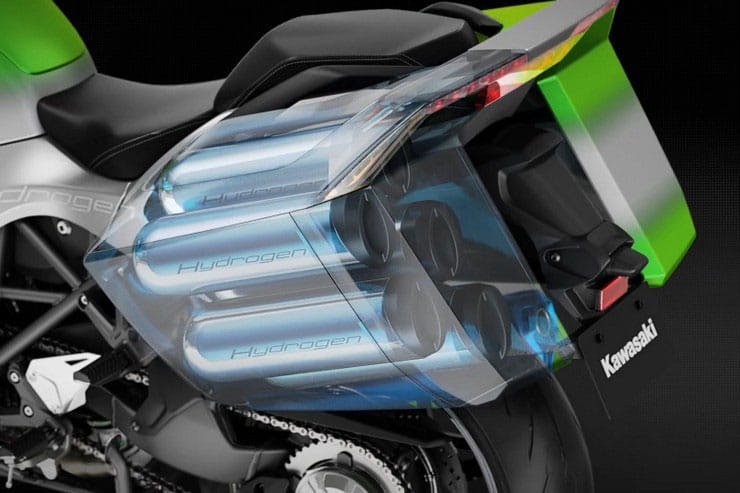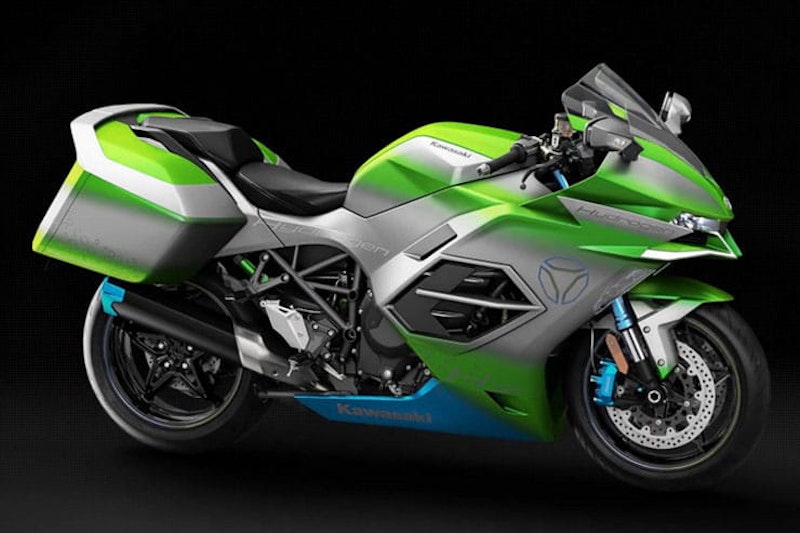Japan’s ‘big four’ join forces on hydrogen engines for bikes
By Ben Purvis
Motorcycle Journalist
18.05.2023
All four of Japan’s big motorcycle brands – Honda, Yamaha, Kawasaki and Suzuki – have put aside the fierce competition that usually rages between them to work together on hydrogen-powered engines for future motorcycles.
In a landmark move, the ‘big four’ have come together, having received approval from Japan’s Ministry of Economy, Trade and Industry to form a technological research association. That means they can use their combined R&D power to pursue a common goal, in this case the development of “hydrogen-powered engines for small mobility.” That term, ‘small mobility,’ is defined as: “motorcycles, Japan-originated mini-vehicles, small marine vessels, construction equipment, drones, etc.”
The new organisation has been named HySE – a title that we revealed back in March this year when Kawasaki filed for trademark rights to the name and a logo to match.
Each company has its own role in the new research group. Honda is tasked with ‘research on the model-based development of hydrogen powered engines,’ for instance, while Suzuki is working on ‘functionality, performance, and reliability of the hydrogen-powered engines.’
However, it’s Yamaha and Kawasaki that are taking the lead roles. Both are working on ‘hands-on research using real hydrogen-powered engines on their functionality, performance and reliability,’ and each has additional tasks, with Yamaha developing refuelling systems and hydrogen tanks while Kawasaki concentrates on the ‘auxiliary equipment required for a fuel supply system and tanks, and the equipment installed between the fuel tank and the injector.’
The four bike firms are to be assisted by two others. One is Kawasaki Heavy Industries, the giant parent company of Kawasaki Motors, which already has plenty of experience in the hydrogen supply chain. The other is Toyota, already working with Yamaha on hydrogen projects and a vocal proponent of the idea of a so-called ‘hydrogen economy.’
We’ve already seen the hydrogen-powered V8 engine developed by Yamaha for a prototype Toyota racing car, and Kawasaki has previewed its supercharged, four-cylinder hydrogen engine – derived from the H2’s motor – and revealed sketches of a proposed sports-tourer it could be used in.
Hydrogen offers certain key advantages as a fuel, notably the fact that when it burns, the main emission is simply water. Compared to zero-emissions battery-powered vehicles, hydrogen-powered ones can be rapidly refuelled and can use technology that’s closer to current combustion engines, which already have a huge global manufacturing base that electric motors and battery systems lack.
But the downsides are just as significant. Hydrogen is only environmentally friendly if it’s produced without carbon emissions, which means using renewable electricity to power electrolysis. An even bigger problem is its storage: the lack of density that makes hydrogen much lighter than air means it takes up a huge amount of space. Even when compressed or cryogenically cooled to liquid form, it’s energy-to-volume ratio is much less impressive than petrol’s. No wonder, then, that part of the HySE group’s remit is to find solutions to “the limited fuel tank capacity in case of use in small mobility vehicles.”
On the engine side, challenges include unstable combustion – essentially an explosion rather than a controlled burn – but since several manufacturers have managed to make working, hydrogen-fuelled engines over the course of several decades, that’s clearly a problem that can be overcome.
Kenji Komatsu, Chairman nominee of HySE and Executive Officer of the Technical Research & Development Centre at Yamaha, said: “We are extremely pleased to announce the planned formation of the association. There are many challenges in the development of hydrogen-powered engines, but we hope to see the association’s activities advance the fundamental research in order to meet those challenges. We are committed to this endeavour with a sense of mission to preserve the use of internal combustion engines, which epitomize the long-time efforts that our predecessors have invested.”
Share on social media:

